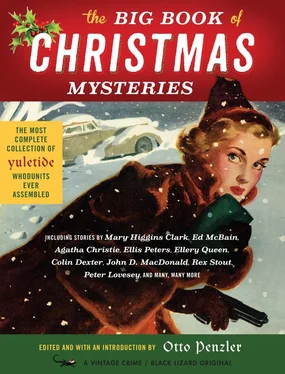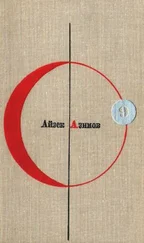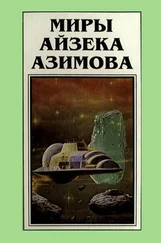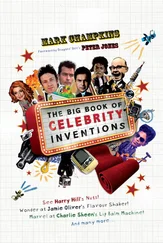“However, the police came at last. They went upstairs with the manager and Mr. Sanders. Later, they sent down for me. I went up. The inspector was there, sitting at a table writing. He was an intelligent-looking man and I liked him.
“ ‘Miss Jane Marple?’ he said.
“ ‘Yes.’
“ ‘I understand, Madam, that you were present when the body of the deceased was found?’
“I said I was and I described exactly what had occurred. I think it was a relief to the poor man to find someone who could answer his questions coherently, having previously had to deal with Sanders and Emily Trollope, who, I gather, was completely demoralized — she would be, the silly creature! I remember my dear mother teaching me that a gentlewoman should always be able to control herself in public, however much she may give way in private.”
“An admirable maxim,” said Sir Henry gravely.
“When I had finished the inspector said:” ‘Thank you, Madam. Now I’m afraid I must ask you just to look at the body once more. Is that exactly the position in which it was lying when you entered the room? It hasn’t been moved in any way?’
“I explained that I had prevented Mr. Sanders from doing so, and the inspector nodded approval.
“ ‘The gentleman seems terribly upset,’ he remarked.
“ ‘He seems so — yes,’ I replied.
“I don’t think I put any special emphasis on the ‘seems,’ but the inspector looked at me rather keenly.
“ ‘So we can take it that the body is exactly as it was when found?’ he said.
“ ‘Except for the hat, yes,’ I replied.
“The inspector looked up sharply.
“ ‘What do you mean — the hat?’
“I explained that the hat had been on poor Gladys’s head, whereas now it was lying beside her. I thought, of course, that the police had done this. The inspector, however, denied it emphatically. Nothing had, as yet, been moved or touched. He stood looking down at that poor prone figure with a puzzled frown. Gladys was dressed in her outdoor clothes — a big dark-red tweed coat with a grey fur collar. The hat, a cheap affair of red felt, lay just by her head.
“The inspector stood for some minutes in silence, frowning to himself. Then an idea struck him.
“ ‘Can you, by any chance, remember, Madam, whether there were ear-rings in the ears, or whether the deceased habitually wore earrings?’
“Now fortunately I am in the habit of observing closely. I remembered that there had been a glint of pearls just below the hat brim, though I had paid no particular notice to it at the time. I was able to answer his first question in the affirmative.
“ ‘Then that settles it. The lady’s jewel case was rifled — not that she had anything much of value, I understand — and the rings were taken from her fingers. The murderer must have forgotten the ear-rings, and come back for them after the murder was discovered. A cool customer! Or perhaps—’ He stared round the room and said slowly. ‘He may have been concealed here in this room — all the time.’
“But I negatived that idea. I myself, I explained, had looked under the bed. And the manager had opened the doors of the wardrobe. There was nowhere else where a man could hide. It is true the hat cupboard was locked in the middle of the wardrobe, but as that was only a shallow affair with shelves, no one could have been concealed there.
“The inspector nodded his head slowly whilst I explained all this.
“ ‘I’ll take your word for it, Madam,’ he said. ‘In that case, as I said before, he must have come back. A very cool customer.’
“ ‘But the manager locked the door and took the key!’
“ ‘That’s nothing. The balcony and the fire escape — that’s the way the thief came. Why, as likely as not, you actually disturbed him at work. He slips out of the window, and when you’ve all gone, back he comes and goes on with his business.’
“ ‘You are sure,’ I said, ‘that there was a thief?’
“He said dryly:
“ ‘Well, it looks like it, doesn’t it?’
“But something in his tone satisfied me. I felt that he wouldn’t take Mr. Sanders in the rôle of the bereaved widower too seriously.
“You see, I admit it frankly, I was absolutely under the opinion of what I believe our neighbours, the French, call the idée fixe . I knew that that man, Sanders, intended his wife to die. What I didn’t allow for was that strange and fantastic thing, coincidence. My views about Mr. Sanders were — I was sure of it — absolutely right and true . The man was a scoundrel. But although his hypocritical assumptions of grief didn’t deceive me for a minute, I do remember feeling at the time that his surprise and bewilderment were marvellously well done. They seemed absolutely natural — if you know what I mean. I must admit that after my conversation with the inspector, a curious feeling of doubt crept over me. Because if Sanders had done this dreadful thing, I couldn’t imagine any conceivable reason why he should creep back by means of the fire escape and take the ear-rings from his wife’s ears. It wouldn’t have been a sensible thing to do, and Sanders was such a very sensible man — that’s just why I always felt he was so dangerous.”
Miss Marple looked round at her audience.
“You see, perhaps, what I am coming to? It is, so often, the unexpected that happens in this world. I was so sure , and that, I think, was what blinded me. The result came as a shock to me. For it was proved, beyond any possible doubt, that Mr. Sanders could not possibly have committed the crime ...”
A surprised gasp came from Mrs. Bantry. Miss Marple turned to her.
“I know, my dear, that isn’t what you expected when I began this story. It wasn’t what I expected either. But facts are facts, and if one is proved to be wrong, one must just be humble about it and start again. That Mr. Sanders was a murderer at heart I knew — and nothing ever occurred to upset that firm conviction of mine.
“And now, I expect, you would like to hear the actual facts themselves. Mrs. Sanders, as you know, spent the afternoon playing bridge with some friends, the Mortimers. She left them at about a quarter past six. From her friends’ house to the Hydro was about a quarter of an hour’s walk — less if one hurried. She must have come in then, about six-thirty. No one saw her come in, so she must have entered by the side door and hurried straight up to her room. There she changed (the fawn coat and skirt she wore to the bridge party were hanging up in the cupboard) and was evidently preparing to go out again, when the blow fell. Quite possibly, they say, she never even knew who struck her. The sandbag, I understand, is a very efficient weapon. That looks as though the attackers were concealed in the room, possibly in one of the big wardrobe cupboards — the one she didn’t open.
“Now as to the movements of Mr. Sanders. He went out, as I have said, at about five-thirty — or a little after. He did some shopping at a couple of shops and at about six o’clock he entered the Grand Spa Hotel where he encountered two friends — the same with whom he returned to the Hydro later. They played billiards and, I gather, had a good many whiskies and sodas together. These two men (Hitchcock and Spender, their names were) were actually with him the whole time from six o’clock onwards. They walked back to the Hydro with him and he only left them to come across to me and Miss Trollope. That, as I told you, was about a quarter to seven — at which time his wife must have been already dead.
“I must tell you that I talked myself to these two friends of his. I did not like them. They were neither pleasant nor gentlemanly men, but I was quite certain of one thing, that they were speaking the absolute truth when they said that Sanders had been the whole time in their company.
Читать дальше












